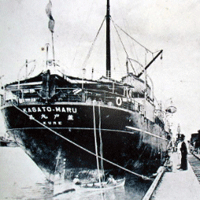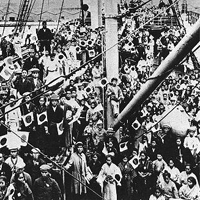
Advanced Reading Comprehension and Translation
Short Stories from Brazil
Professor Ted Mack
Spring 2012: JAPAN 433
Mondays, Wednesdays, and Fridays
9:00-10:20am
DEN 206

 |
Advanced Reading Comprehension and Translation Short Stories from Brazil Professor Ted Mack Spring 2012: JAPAN 433 Mondays, Wednesdays, and Fridays |
 |
We will read stories written in Brazil between 1937-40, all of which appear in this PDF from the Koronia shôsetsu senshû, volume 1. The stories appear in the PDF in order of publication; we may not read them in that order. You will also want to download the following vocabulary list of colonia-go.
You will need a good dictionary. There are some excellent online options, including Weblio, goo, and Yahoo! Japan's dictionary. You would also find a grammar reference, such as this one, very handy. If you prefer paper dictionaries, look for a good collegiate Japanese-English dictionary and a medium-sized Japanese-Japanese dictionary. If you do not have Internet access, consider investing in an electronic dictionary. If you have an iPhone or an iPod Touch, look at this comparison of the various dictionary apps that are available. Many students have found the Daijirin to be the best deal.
On occasion, elaborations and clarifications of classroom discussions will be posted to my course blog, Reading Japanese.
Reading Schedule:
Students' reading speeds differ so dramatically that it is difficult to provide a detailed schedule in advance. Please come to the first day of class to find out how much to prepare for subsequent meetings. No preparation is required for the first day of class, March 26.
Please note that I will traveling on the following dates: April 6, April 13, and April 27. I will try to find substitutes for those days, but please note that I might have to cancel one or more of those class meetings.
About the Course:
This course focuses solely on developing advanced Japanese reading skills through practice. Students read through contemporary Japanese fiction on their own and then meet to go over that reading, focusing on grammar and vocabulary but also discussing literary devices and effects. Unlike most other language offerings, this course is made up of readings that have not been tailored or selected for ease of comprehension. Students read celebrated stories of recent years, regardless of difficulty, in their complete form. The goal of the course is to introduce students to the real complexity and beauty of written Japanese, while providing them with the tools necessary to read even the most challenging fiction. The hope is that the course will begin students on a lifelong path of reading Japanese literature – whether professionally or recreationally.
A grade of 2.5 or higher in JAPAN 313 or its equivalent is an absolute requirement. A high level of Japanese reading ability is required; expect the gulf between third-year Japanese readings and these stories to be substantial.
The syllabus below will be in flux throughout the semester as we move through the stories. Please talk with your classmates about where we are for any given class meeting.
Required Materials: This PDF from the Koronia shôsetsu senshû, volume 1, and this vocabulary list of colonia-go (from the same volume) are the only required texts for this course.
Grading:
Participation and preparation (50%):
All class members will be expected to complete assigned readings before class meets. Class meetings will involve recitation in Japanese, translation, and discussion of grammar in either English or Japanese. Every student will be called on at every class meeting; likely each will be called multiple times. Inadequate preparation will result in a reduction of one's participation grade. Late arrivals disrupt class; therefore you are expected to arrive on time. Please turn off all cell phones before class begins.
Weekly short quizzes (30%; every Monday, unless otherwise noted):
Quizzes will be made up of translation questions involving sentences chosen from the previous week's reading.
Final comprehensive quiz (20%):
The final quiz, held on the last day of class, will be made up of translation questions involving sentences chosen from among all the readings.
The copyright law of the United States (Title 17, United States Code) governs the making of photocopies or other reproductions of copyrighted materials. Under certain conditions specified in the law, libraries and archives are authorized to furnish a photocopy or other reproduction. One of these specified conditions is that the photocopy or reproduction is not to be "used for any purpose other than private study, scholarship, or research." If a user makes a request for, or later uses, a photocopy or reproduction for purposes in excess of "fair use," that user may be liable for copyright infringement.
Page last updated on March 26, 2012